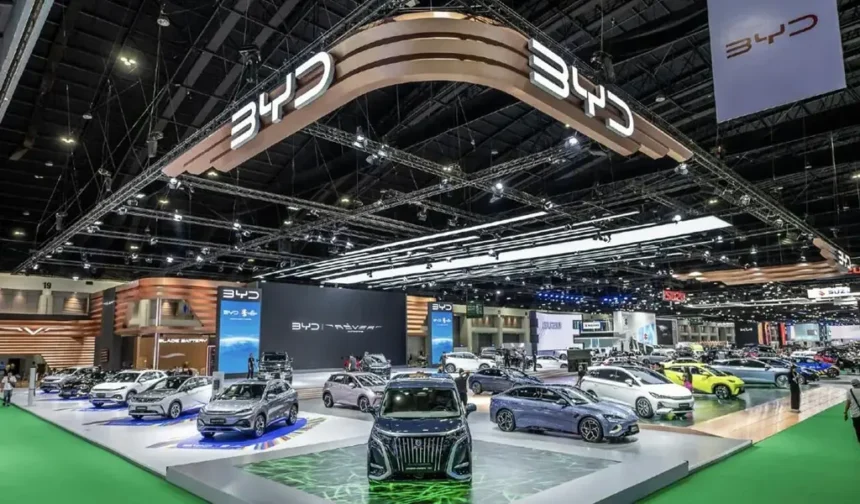Thailand’s electric vehicle sales are anticipated to rise by 40% in 2025, primarily due to government subsidies and production requirements.
The government’s incentives are expected to significantly increase Thai EV production, potentially starting an aggressive price war in the already struggling auto market.
The sector is dominated by Chinese automakers, who capitalize on subsidies and tax breaks. However, the sector faces substantial obstacles due to oversupply and poor domestic demand.
Thai’s electric vehicle (EV) sales are anticipated to increase by 40% in 2025 due to a national incentive program that mandates local production to qualify for tax benefits.
Thai subsidies of up to 150,000 baht and tax incentives have established Thailand as the largest EV market in Southeast Asia; however, they also risk exacerbating price battles.
Despite the substantial investments made by Chinese automakers such as BYD and Great Wall Motor in Thailand, concerns regarding oversupply and steep discounts continue to exist.
Domestic auto sales reached a 15-year low in 2024, and local production may be penalized if requirements are unmet.
The Thai government has implemented regulations extending battery production timelines and promoting hybrid vehicles to mitigate oversupply.
The Thai electric vehicle market is expected to experience a price war, which will intensify due to limited demand and increased local production.
The traditionally Japanese-dominated auto industry has been challenged by the substantial investment of Chinese manufacturers in Thailand’s EV sector.
The government’s supportive policies for electric vehicle production and adoption and Thailand’s strategic location in Southeast Asia are the primary factors driving this increase in investment.
BYD and Great Wall Motors have introduced affordable and innovative electric vehicle models tailored to local preferences, intensifying competition due to the influx of Chinese brands.
In the interim, Japanese manufacturers are intensifying their efforts to preserve their market position by emphasizing the development of hybrid technology and the expansion of their electric vehicle offerings.
The evolving landscape has established the automotive industry in Thailand as a regional hub for electric mobility, transforming the industry.
According to Suroj Sangsnit, president of the Electric Vehicle Association of Thailand (EVAT), the largest EV market in Southeast Asia, electric vehicle sales are expected to increase by 40% this year, surpassing 100,000 units and rebounding from an 8% decline in sales last year. His statement was provided to Reuters.
In December, Thai auto production experienced its 17th consecutive month of decline due to weak domestic and international demand. In 2024, vehicle exports experienced an 8.8% decline, while domestic sales experienced a 26% decline, the lowest level in 15 years.
Automakers from China are operating in Thailand.
Through consumer appeal and localization strategies, Chinese manufacturers substantially impact Thailand’s electric vehicle (EV) market. The following are several critical points:
Localization Strategies: Chinese manufacturers are implementing comprehensive localization strategies, which include establishing local production facilities. For instance, BYD intends to commence EV production at its new facility in Thailand by the third quarter of 2024, with an annual production capacity of approximately 150,000 units.
Sentiment of the Consumer: A recent study by Vero and WeBridge revealed that 72% of Thai consumers have generally favourable perceptions of Chinese cars. These vehicles are perceived as stylish, technologically advanced, and affordable, which makes them alluring to price-conscious consumers.
Market Leadership: In Thailand, Chinese manufacturers such as BYD have emerged as market leaders.BYD is currently the market champion in Thailand’s electric vehicle sector, with SAIC and Hozon closely behind.
Thailand’s Automotive Industry: Thailand, frequently referred to as the “Detroit of Asia,” actively entices car manufacturers with incentives for producing electric vehicles and consumers. This has rendered it an appealing market for Chinese automobile manufacturers.
The rise of Chinese automakers is challenging the traditional dominance of Japanese manufacturers in Thailand’s EV market. Thailand’s transition to electric vehicles (EVs) is a test case for other economies as Chinese automakers expand their exports and establish overseas production centres.
These factors suggest a substantial transformation in Thai automotive sector, with Chinese manufacturers playing a critical role in developing the nation’s electric vehicle market.
Thailand is establishing itself as a regional centre for electric vehicle production as partnerships and investments continue to grow. The government’s supportive policies and infrastructure improvements further accelerate the adoption of electric vehicles (EVs), fostering opportunities for sustainable growth and innovation in the sector.

Salman Ahmad is known for his significant contributions to esteemed publications like the Times of India and the Express Tribune. Salman has carved a niche as a freelance journalist, combining thorough research with engaging reporting.













